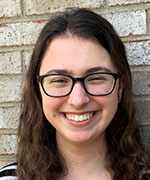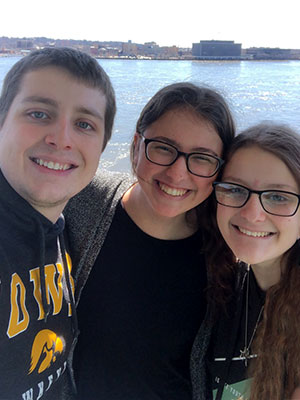
"Getting involved in research within your first two years is definitely beneficial. I think it'll help in classes and help you figure out your interests and develop research skills earlier. All departments have a list of professors and their interests, areas of study, and their research. Find a professor that might have a similar interest that you have and take a class with them — see what it's like and what they say."
Why Miami?
"I'm a first-generation college student, so for me it was really important to be strategic about where I chose to go to school. I wanted to look at all the opportunities available at a university so I could choose the university that I felt could best help me find my interest and actually get involved in something.
"I want to go to seminary and get my Masters of Divinity, and then I want to look at becoming a pastor of a church or be involved in some sort of church organization. I intentionally chose Miami because I didn't want to go to a religious school. I had a lot of family members that were like, 'You need to go to a school that is Christian!' and I was like, 'Actually, I'm going to go to a public university!' because I felt like there was more diversity within the student population and also more diversity within the majors offered and the overall experiences I could have.
"At Miami I'm able to explore a ton of different perspectives and viewpoints. Seminary is for learning about religious ideas and really solidifying that, while undergrad is for exploring different traditions and being able to understand and respect other people. That's what I wanted in Miami, and I feel like I've gotten that.
"Another thing about Miami that I liked was the humanities research. I feel like a lot of other schools didn't have that as much and didn't fund as much for humanities research. I talked to Miami's Department of History and Department of Comparative Religion and heard about their different research projects and was really impressed. I knew research was something I wanted to get involved in my freshman year, and Miami definitely has that availability!"
Best Miami Experiences

Alexa Lawhorn (center) with some friends
"My first year at Miami was definitely an adjustment, but once I found what I really wanted to do and I saw all the opportunities, I was like, 'Okay, forget about home, I'm excited to be here.' I think the first year was definitely about finding my interests and finding what I was really passionate about and making connections with professors.
"I also joined the Honors Student Advisory Board (HSAB) because I wanted to find more connections within the honors community; I wanted to build a bigger community, and HSAB allowed that, and I think it's a great organization.
"One of my comparative religion professors my first semester was assistant teaching professor Hillel Gray. I was really interested in his research project, Empathy and the Religious 'Enemy,' so I purposefully took his Religion 101 class. I'd heard about it when I did a Miami tour. I told Dr. Gray that I was really interested, and he told me about his research. I kept in contact with him that spring semester and then did research with him over the summer. That first year was very much just about making connections and finding my interests in what I felt passionate about."
Miami and the Liberal Arts
"One thing I really love about both of my departments, history and comparative religion, is how much the professors want to get to know the students and make those personal connections. You get to hear about their research, and they like to ask you questions about what you're interested in, and then you can geek out together, which is always super fun.
"I think a lot of high schoolers think history is just about learning facts and then being able to regurgitate facts, but history is much more. To me, it's much more about developing analytical skills and being able to make connections between the modern day and the past. You can do so many things within history, and you can look at it through so many different lenses, it's just amazing.
"My comparative religion major is also much more analytical than I think people perceive it to be. A lot of people think it's much more about just learning about different religions, but it's also about learning about how religion forms, the different forms it takes, and how it changes throughout time.
"I also just really like the diversity of classes that are available. For history, there's not just U.S. history classes; it overlaps with things like Latin American, Latino/a, and Caribbean Studies and Critical Race and Ethnic Studies. There are different lenses you can use to look at different eras of history, and I like that diversity. Professors always bring an interesting viewpoint, and they make you think deeper about what you're learning about.
"In comparative religion too, there's just such a wide range of classes. It's not just about Christianity. Right now I'm taking a class about women's religious experiences in the ancient Mediterranean, so you're not just focusing on one viewpoint."
Understanding Empathy and the Religious "Enemy"

Sofia Vlahakos, Mary Beth DeRuntz, Alexa Lawhorn, Jacob Z. Phelps
"Dr. Gray has a research project called Empathy and the Religious 'Enemy,' in which he looks at religious groups that are normally seen as controversial. He sits down and interviews these individuals within these groups, asking them personal questions and having them talk about their emotions.
"One of his goals is to study the idea of empathy. I've gone on the trip to Topeka, Kansas twice to meet with members of the Westboro Baptist Church, and that's been a really amazing experience. I think Dr. Gray does a really good job of trying to show how you can empathize with people who think differently than you, and I know that I've grown in my empathy since I've been involved.
[Editor's note: Dr. Gray adds that empathy "is not sympathy or approval, but rather a critically-informed and emotionally-grounded nonjudgmental understanding of other people."]
"The project is an experience that helped me maintain the skill of critical distance. Especially when learning about other beliefs, I'm able to take a step back instead of trying to insert my own beliefs. I think that's a really important skill. If I'm going to be a pastor, I need to have the ability to empathize with other people and listen, because a pastor is supposed to counsel people. How are you supposed to counsel people if you can't listen to them, even if you disagree with them?
"A big thing right now is, how do you build connections across divisions? For example, we've just had a very contentious election, and the country is still divided. It's important to have the ability to empathize. I thought I was an empathetic person when I came into college, but after going on these trips every single time I see how much my empathy has grown. I think in today's climate there's a lot of tension among people who think differently, so I think having that ability is definitely important."
Advice to Students
"Find your passion. That's so cliché, but — find a major that you care about. Even if you don't know what you want to do, just find something that inspires you and that you can shape a future out of. If you have the flexibility to take classes that are outside your comfort zone or it's something that you normally wouldn't want to take, take it! You have the time now. Try to explore outside your major.
"Getting involved in research within your first two years is definitely beneficial. I think it'll help in classes and help you figure out your interests and develop research skills earlier. All departments have a list of professors and their interests, areas of study, and their research. Find a professor that might have a similar interest that you have and take a class with them — see what it's like and what they say. The history and comparative religion professors differ so much in their interests. They all have different areas of expertise, and there's so many different opportunities.
"Don't be nervous about what other people will think of you. A lot of my family members were like, 'Okay Alexa, what are you gonna do with a history major? Why would you major in that?' But you can do stuff with it! So, just remember that even if other people are critical of your major, those professors and that department will help you, and they will encourage you too. They're awesome."
[November 2020]
 Miami University Oxford, Ohio est. 1809
College of Arts and Science
Miami University Oxford, Ohio est. 1809
College of Arts and Science
 Miami University Oxford, Ohio est. 1809
College of Arts and Science
Miami University Oxford, Ohio est. 1809
College of Arts and Science